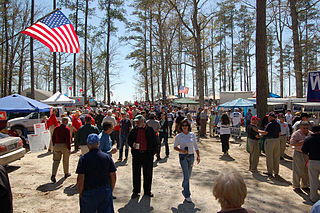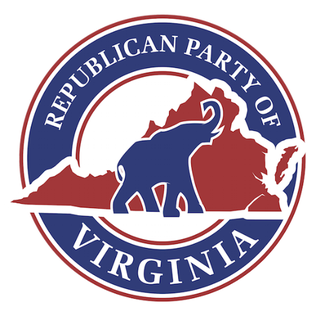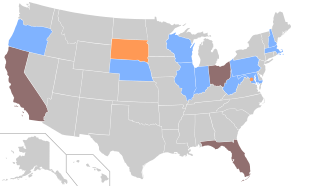
Epsilon Sigma Alpha International (ΕΣΑ) is an International community and collegiate coeducational service organization. Established in 1929, Epsilon Sigma Alpha is a network of an estimated 10,000 members in over 1,000 community-based chapters, with coordinating organizations at state and international levels. ΕΣΑ also includes United States collegiate chapters that provide charitable service to their campuses and communities.

The National Beta Club is an International honor society for 4th through 12th-grade students. Its purpose is to promote academic achievement, character, leadership, and service among elementary and secondary school students. The National Beta Club is the largest independent educational society for youths in the United States. Headquartered in Spartanburg, South Carolina, the organization has more than 9,600 clubs nationally and more than 450,000 active members.

The Shad Planking is an annual political event in Virginia which takes place every April near Wakefield in Sussex County. It is sponsored by a chapter of the Ruritans, a community service organization which was founded in the small town of Holland about 30 miles to the southeast.

The Republican Party of Virginia (RPV) is the Virginia chapter of the Republican Party. It is based at the Richard D. Obenshain Center in Richmond. As of May 2024, it controls all three statewide elected offices, 5 out of 11 U.S. House seats, and the governor's seat within the state.

Allen Taylor Caperton was an American politician who was a United States senator from the State of West Virginia in 1875–1876. He was a member of the Democratic Party. He had been in the Virginia House of Delegates and Virginia Senate before the American Civil War. During the Civil War, he was a Confederate States senator.

The Raven Society is an honor society at the University of Virginia in Charlottesville, Virginia. It was founded in 1904 by William McCully James who named it in honor of the poem by Edgar Allan Poe, who attended the University of Virginia in 1826.

From February 20 to June 12, 1984, voters of the Democratic Party chose its nominee for president in the 1984 United States presidential election. Former Vice President Walter Mondale was selected as the nominee through a series of primary elections and caucuses culminating in the 1984 Democratic National Convention held from July 16 to July 19, 1984, in San Francisco, California.

From March 8 to June 7, 1960, voters and members of the Democratic Party elected delegates to the 1960 Democratic National Convention through a series of caucuses, conventions, and primaries, partly for the purpose of nominating a candidate for President of the United States in the 1960 election. The presidential primaries were inconclusive, as several of the leading contenders did not enter them, but U.S. Senator John F. Kennedy of Massachusetts emerged as the strongest candidate and won the nomination over Lyndon B. Johnson at the convention, held from July 11 to 15 at the Los Angeles Memorial Sports Arena.

Junius Edgar West was a Virginia politician and businessman who was born in Sussex County, Virginia, on July 12, 1866, and whose long and distinguished career culminated in two terms as the 22nd Lieutenant Governor of Virginia.

Benjamin Lee Cline is an American lawyer and politician who has served as the U.S. representative for Virginia's 6th congressional district since 2019. A member of the Republican Party, he represented the 24th district in the Virginia House of Delegates from 2002 to 2018.
Major McKinley Hillard was a Virginia politician and judge from Chesapeake, Virginia.

Edward Griffith Dodson was an American lawyer and Democratic politician who was Clerk of the Virginia House of Delegates from 1934 to 1962, and author of much-used biographical compilations of Virginia public officials.
Garland Gray was a long-time Democratic member of the Virginia Senate representing Southside Virginia counties, including his native Sussex. A lumber and banking executive, Gray became head of the Democratic Caucus in the Virginia Senate, and vehemently opposed school desegregation after the U.S. Supreme Court decisions in Brown v. Board of Education in 1954 and 1955. Although Senator Harry F. Byrd himself supported Massive Resistance, and preferred Gray over other candidates, the Byrd Organization refused to wholeheartedly support Gray's bid to become the party's gubernatorial candidate in 1957, so J. Lindsay Almond won that party's primary and later the Governorship.
John Baker Boatwright was Virginia lawyer and member of the Virginia House of Delegates representing Buckingham, Appomattox and Cumberland Counties for 38 years beginning in 1922. A member of the Byrd Organization, Boatwright became a leader of its Massive Resistance to racial integration.

Joseph Judson Williams Jr. was a Virginia lawyer and banker, who served part-time for more than two decades representing Henrico County, Virginia, in the Virginia House of Delegates. A member of the Byrd Organization, Williams participated in its Massive Resistance to racial integration, but left that political crisis to serve as a member of the Federal Home Loan Bank Board for the three years before his death.

Morton Graham Goode was a Virginia lawyer and Democratic member of the Senate of Virginia. Allied with the Byrd Organization, Goode represented a district centered around Petersburg part time for more than two decades. During his last term before retiring and in the absence of Virginia's Lieutenant Governors, Goode led the Virginia senate as its President pro tempore.

Harold Hidmore Purcell was an American lawyer, judge and politician affiliated with the Byrd Organization who served in both houses of the Virginia General Assembly representing his native Louisa County and adjacent counties (1948-1965), and later as Circuit Judge for what was then the 16th Judicial Circuit (1966-1979)(also covering Louisa County).

This is a timeline of women's suffrage in Virginia. While there were some very early efforts to support women's suffrage in Virginia, most of the activism for the vote for women occurred early in the 20th century. The Equal Suffrage League of Virginia was formed in 1909 and the Virginia Branch of the Congressional Union for Woman Suffrage was formed in 1915. Over the next years, women held rallies, conventions and many propositions for women's suffrage were introduced in the Virginia General Assembly. Virginia didn't ratify the Nineteenth Amendment until 1952. Native American women could not have a full vote until 1924 and African American women were effectively disenfranchised until the Voting Rights Act passed in 1965.
Elwood Floyd Yates was an American automobile dealer, farmer and politician who served for over a decade in the Virginia House of Delegates(1940-1951).
William Tayloe Murphy was an American politician and businessman from Virginia. He served in the Virginia House of Delegates from 1940 to 1942 and from 1948 to 1959. He was Virginia State Treasurer from 1942 to 1947.















